Nov
3
2009
or Every Knee Shall Bow
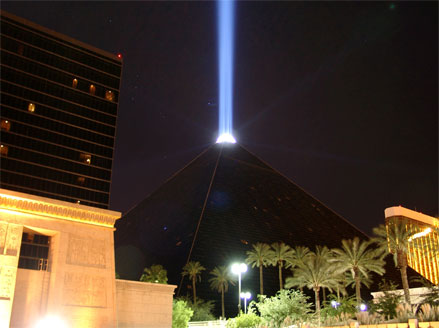
Day 1
So, Adam fouled the first Sabbath. He failed to be Light.
Day 2
Cain made a false exodus (with Abel as the Passover lamb) and went to “worship in the wilderness.” God marked him as a “covering.” Being “barren”, Cain built a city as a covering, but it was just like Adam’s figleaves. It was a phony firmament, a fabricated Covenant, a city built on the wrong sort of blood.
Day 3
His offspring built a counterfeit Tabernacle – in opposition to the worship at the Gate of Eden. This was a false Land, a false mountain, like Mount Gerizim became to the Samaritans. Lamech, as a false Moses, “ascended” not as a Lamb slain, but as an accuser, the incarnation of the serpent. But someone true ascended as Firstfruits: Enoch.
This brings us to Day 4. As in the Garden, and as in Israel’s wilderness, the test was harlotry.
Continue reading
Comments Off | tags: Abel, Babylon, Cain, Egypt, Enoch, Genesis, Herod, Incense Altar, Lamech, Noah, Satan, Seth, Sodom | posted in Biblical Theology, The Last Days
Jul
9
2009
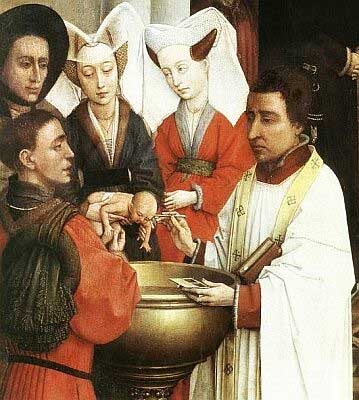
or Why Are We Baptizing the Dead?
Peter Leithart writes concerning baptism:
“In Genesis 9:11, Yahweh promises not to “cut off flesh” by water. That is the covenant with Noah.
A few chapters later, Yahweh tells Abram that he must cut off the flesh of all male children of Israel, not by water but by a knife.
Continue reading
2 comments | tags: Adam, Baptism, Circumcision, Federal Vision, John Piper, Noah, Peter Leithart, Systematic typology, The flood | posted in Christian Life
Jun
12
2009
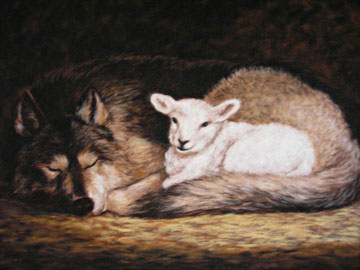
Isaiah’s visions of Israel’s restoration have nothing to do with a future millennial golden age for the Jews, or even directly with the first century, except by the events of the Restoration era prefiguring later history. His words were for his hearers, for both their condemnation and their hope in the near future. Why do we get him wrong?
Continue reading
3 comments | tags: David, Isaiah, Millennium, Mordecai, Noah, Restoration, The flood, Zerubbabel | posted in Biblical Theology, The Last Days, The Restoration Era, Totus Christus
Apr
16
2009
“Because of Christ we are thought of as fools, but Christ has made you wise. We are weak and hated, but you are powerful and respected. Even today we go hungry and thirsty and don’t have anything to wear except rags. We are mistreated and don’t have a place to live. We work hard with our own hands, and when people abuse us, we wish them well. When we suffer, we are patient. When someone curses us, we answer with kind words. Until now we are thought of as nothing more than the trash and garbage of this world.” 1 Corinthians 4:10-13
So, are God’s people to wear rags? Or should they be dressed well like Solomon or the woman in Proverbs 31? Or is that even the right question?
Continue reading
Comments Off | tags: Adam, Corinthians, Daniel, Ecclesiology, Ezekiel, Ezra, Joseph, Maturity, Mordecai, Nehemiah, Noah, Paul, Proverbs, Robes, Solomon | posted in Biblical Theology, Totus Christus
Apr
10
2009
Solomon’s New Broom
Solomon continued David’s role as redeemer/blood avenger. Like Ham’s attack on Noah, and Absalom’s sin on the roof, Adonijah’s request for one of David’s concubines was recognised as a grasp for the throne. Joab was judged for his shedding of innocent blood, and although he grasped the horns of the altar, refuge was lawfully denied (Numbers 35:15-19).1
The last priest of the house of Eli, Abiathar, was exiled before the Ark was given a permanent house. Like Gideon’s bull, the guilty “died” on the old altar before a new one could be established.
Solomon’s judicial execution of his father’s enemies was not paranoid. It was “good death.” The Lord always builds His house out of the corpses and plunder of His enemies. As death precedes resurrection, so discipline must come before joy (Hebrews 12:11) and Solomon’s actions here demonstrated his great wisdom as a judge.
______
1 “Why grasp the horns of the altar when you’re a fugitive in the temple? How is it legitimate to touch the horns, when the altar as a whole is forbidden to all but the priests? The answer to the first is found in the premise of the second: The altar is holy, and communicates holiness to anyone who touches it (if they aren’t holy already). When a fugitive grasps the horns of the altar, he becomes sanctified and hence inviolable. If found guilty, he will be killed (like Joab) because of a sacrilege; but if he is innocent, he protects himself with a taboo of holiness.” Peter J. Leithart, Horns of the Altar, www.leithart.com
Comments Off | tags: Absalom, Adonijah, David, Ham, Justice, Noah, Peter Leithart, Solomon, Wisdom | posted in Biblical Theology, Ethics
Apr
10
2009
A recurring pattern throughout the Bible is this one: Called, Divided, Filled and Reunited.
We see it in the exodus. The Hebrews are divided from Egypt through a divided sacrifice and a divided sea (blood and water). In the wilderness, Israel is betrothed to God by Covenant, and fed with miraculous bread. An enormous haul of grapes brings a promise of wine, but they aren’t ready for it.* After a generation, Israel is no longer just a people but an army. She has been ‘filled.’ Through another crossing of water and blood (Jordan and Jericho), she is finally united to her Husband in the promised land.
God always divides, fills and reunites. Creation consisted of three days of dividing and three days of filling the 3 new ‘chambers.’ God divided Adam to construct Eve.
In Communion, the bread and wine are given separately. Christ’s body is dividedfrom His blood. We are filled, and His body and blood are reunited in us. As we partake, we, Greater Eve, fulfill His resurrection as a holy army (Ez. 37; John 12:24).
*We see this pattern in the garden of Eden, with a bread tree (priest) and wine tree (king). Adam wasn’t ready for the wine of kingdom. It would be another generation, Noah’s, who would drink wine before God in a new land.
Comments Off | tags: Communion, Covenant Theology, Noah, Typology | posted in Biblical Theology
Apr
10
2009
Land.
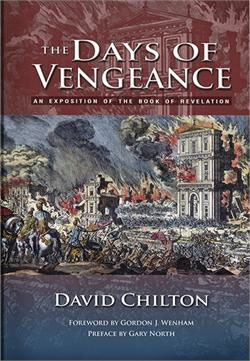
I read David Chilton’s The Days of Vengeance in 1989, and it sure surprised me to learn that the word ‘earth’ in the Bible also means ‘land.’ This simple fact alters the scope of John’s Revelation entirely. It is about God’s ending of the Covenant He restored after the Babylonian captivity, and so first century Judah is the main subject. It was a repeat of events in Jeremiah’s day, so let’s backtrack a little…
Continue reading
15 comments | tags: AD70, Bible history, Compromise, David Chilton, Dispensationalism, Exile, Ezekiel, Noah, Resurrection, Temple | posted in Against Hyperpreterism, Biblical Theology, The Last Days, The Restoration Era
Apr
8
2009
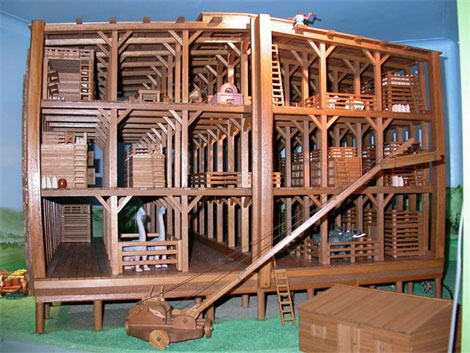
“God told Noah to build the Ark with nests inside. The word qen {kane} is translated nests every other time it appears in Scripture, but most versions substitute the word rooms only for Noah’s Ark. Since there is no good reason to do this, we should take nests as the preferred option. Thinking in terms of nests rather than rooms, we begin to see a different view of how the animals may have been housed…
As nests, it would be inappropriate to imagine animals lined up on display or herded together in huge stalls. Neither option would suit animal transport anyway. Instead, we should be thinking of snug, private enclosures where an animal would hide and bed down. The enclosure should be comfortable, safe, private, warm and probably darkened. It should also be an area that is not routinely disturbed.”
from www.worldwideflood.com
If the ark prefigured the Temple and the body of Christ, a floating “house” mediating between the old world and the new, the congregations within His body are “nests.”
Comments Off | tags: Noah, The flood | posted in Biblical Theology, Creation
Apr
8
2009
“Even if Noah, Daniel, and Job were living in that nation, their faithfulness would not save anyone but themselves. …even if Noah, Daniel, and Job were living there, I, the Lord, promise that the children of these faithful men would also die. Only the three of them would be spared.” (Ezekiel 14:14, 20)
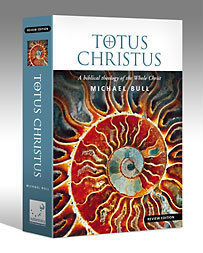 The mediation of even the holiest men would not avert God’s judgments. Noah had failed to prevent the destruction of the old world. Daniel had failed to prevent the destruction of the Land. Job had failed to prevent the destruction of his children. Like the three domains under these men, Jerusalem was beyond deliverance. And even if these holy watchmen were present in Jerusalem, they alone would be saved. These three only would be rescued from Sodom like Lot. In chapter 23, Ezekiel refers to Jerusalem as Sodom. Jerusalem the oppressor was also like Egypt. As the Land symbolically had four corners, four judgments would desolate it: sword, famine, beasts and pestilence, the Covenant curses from Leviticus 26. This was the Levitical sword indeed. The exiles, as watchmen, would see the repentance of the “marked” survivors and know that the Lord had not acted without cause.
The mediation of even the holiest men would not avert God’s judgments. Noah had failed to prevent the destruction of the old world. Daniel had failed to prevent the destruction of the Land. Job had failed to prevent the destruction of his children. Like the three domains under these men, Jerusalem was beyond deliverance. And even if these holy watchmen were present in Jerusalem, they alone would be saved. These three only would be rescued from Sodom like Lot. In chapter 23, Ezekiel refers to Jerusalem as Sodom. Jerusalem the oppressor was also like Egypt. As the Land symbolically had four corners, four judgments would desolate it: sword, famine, beasts and pestilence, the Covenant curses from Leviticus 26. This was the Levitical sword indeed. The exiles, as watchmen, would see the repentance of the “marked” survivors and know that the Lord had not acted without cause.
Comments Off | tags: Daniel, Egypt, Ezekiel, Job, Noah, Sodom | posted in Biblical Theology, Totus Christus































